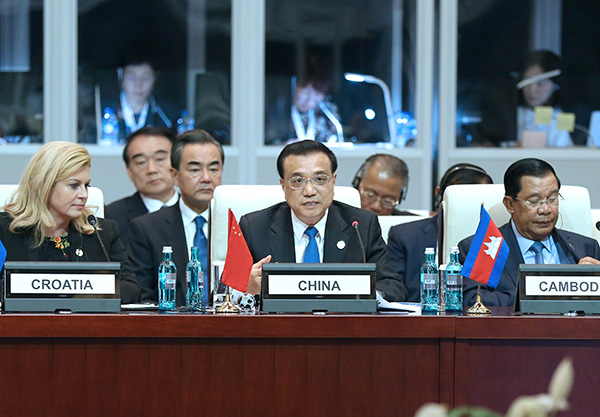Time for ASEM to play its essential role
Updated: 2016-07-16 09:03
By Shada Islam(China Daily)
|
|||||||||
 |
|
Chinese Premier Li Keqiang addresses the 11th Asia-Europe Meeting Summit in Ulaanbaatar on July 15, 2016. [Photo/provided to China Daily] |
The Asia-Europe Meeting is the right platform for a conversation on shared global challenges. With Britain's exit from the European Union, the world economy in poor shape, growing inequalities and discontent with globalization on the rise, the two-day meeting of Asian and European leaders in Ulan Bator, Mongolia, from Friday has acquired greater importance.
Add to the list the increasing disconnect and mistrust between governments and citizens-especially between leaders and youths-rising populism, fears of uncontrolled immigration and terrorism and it will become clear that leaders at ASEM have their hands full.
Asian leaders and policymakers may believe most of these issues apply only to Europe. The truth is otherwise. Brexit has highlighted the strength of these and other preoccupations among Britons (and other European voters), but many people across the world also share them.
Asia is as unequal a continent as is Europe. Both continents have winners and losers of globalization and both face threats from terrorists. Populist politicians may be making headlines in Europe but they exist in Asia, too. So leaders in both Asia and Europe need to build stronger connections with youths and respond to their worries about education, jobs, exclusion and marginalization.
ASEM offers a unique platform for an open, no holds-barred high-level brainstorming on such issues. In fact, it is the need for such conversations that led to the creation of ASEM 20 years ago-and such conservations are likely to make ASEM geo-strategically relevant again.
The emphasis of ASEM stakeholders-including policymakers, members of parliament and civil society, academics and think tank representatives, as well as youths and business leaders-should now be on new ideas and increased connectivity as part of a potent new recipe for injecting new energy and dynamism into ASEM.
Interestingly, China's focus on connectivity-through transport links, educational ties and digital information highways-has revitalized ASEM discussions, which now needs to be taken further. Transforming ASEM into a network of ideas and initiatives will give Asia-Europe ties a geo-strategic raison d'etre which it has lost over the past two decades.
Asia-Europe connectivity is now a fact of life, and reinforcing it through stronger institutional, infrastructure, digital and people-to-people linkages is emerging as a central element of efforts to rejuvenate ASEM.
ASEM has met many of its original goals by providing Asian and European leaders with opportunities to better know each other, encouraging greater people-to-people understanding and providing the two continents with avenues to explore new areas of cooperation in political, economic and social fields.
Also, meetings among business leaders, parliamentarians, academics and civil society members-and young leaders-have allowed ASEM to enhance Asia-Europe understanding and upgrade the quality and diversity of inter-continental conversations.
While these connections are important, ASEM can do much more by playing a more central role than it has so far in generating, nourishing and disseminating new ideas about living and working together in a globalized world.
This requires the setting up of an "ASEM Brains Trust" or network of think tanks, which can transform ASEM into a market place for ideas and initiatives. Proposals and ideas generated by such a network should be fed directly into the work of senior ASEM officials and the activities of other stakeholders. Such tasks could be performed by an ASEM coordination center that has been recommended by Mongolia.
This combination of ideas and connectivity allowing for a permanent circulation and exchange of thoughts, knowledge, experience and expertise could revive ASEM. And the summit in Ulan Bator should revive ASEM so that it can help increase Asia's and Europe's understanding of a complicated and turbulent world.
The author is policy director of Friends of Europe, a leading think tank in Brussels.
Related Stories
Premier Li takes group photo with leaders at ASEM summit 2016-07-15 17:36
China remains top trade partner for EU among ASEM in 2015 2016-07-15 11:17
ASEM is expected to return to its original purpose 2016-07-13 07:59
China offers fresh proposals at ASEM meeting 2015-04-30 11:21
Premier Li to promote interconnectivity at ASEM and update Asia-Europe cooperation 2016-07-12 11:16
ASEM summit highlights Asia-Europe inter-dependence 2014-10-17 10:26
Today's Top News
French city comes to terms with brutal terror attack
Police probe terrorist's past after attack kills 84
Chinese FM extends condolences to attack victims
Li slams attack in France, expresses condolence
Live: Truck attack kills over 80 in Nice
May stuns political world by appointing Boris Johnson
Li calls Sino-Mongolia ties 'best ever'
Russian, Chinese officials discuss space cooperation
Hot Topics
Lunar probe , China growth forecasts, Emission rules get tougher, China seen through 'colored lens', International board,
Editor's Picks

|

|

|

|

|

|







